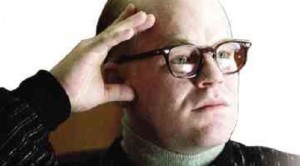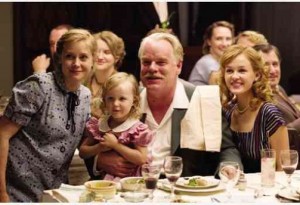Philip Seymour Hoffman: An Appreciation
LOS ANGELES—“I just wanted to be an audience member,” Philip Seymour Hoffman recalled, in one of our several interviews, his most fervent wish when he was in his pre-teens. Fortunately for us, Philip instead went on to audition for stage roles, leading to stunning performances in theater, television and film. He left us with that priceless legacy when he died in his native New York last Feb. 2—a shocking, saddening piece of news.
“It’s the corniest story but it’s true,” the actor said of his simple ambition then to be in a dark theater, seated with everyone else. What we’ll always remember about Philip is that when he said or heard things that amused him, he smiled, and his eyes lit up as well. It was like his whole being beamed.
Mad about theatre
“I was mad [about theater] but I had no inclination to do it,” he said in that voice that we’ll also cherish having heard in person—low, calming and distinctive. “I just thought, oh God, if every week of my life I could come and sit in a theater and watch a play, it’s going to be a good thing.”
Philip expressed gratitude to his mother, Marilyn O’Connor, a family court judge (his father, Gordon Hoffman, was a Xerox executive). “My mom took me to the theater when I was 11 or 12 years old,” he recounted. “She started taking me to this regional theater house where I grew up, in Rochester (New York). I saw a lot of plays at that time and not musicals. I saw Arthur Miller, new plays and a lot of mature stuff and I loved that. I could not get enough of it. I thought it was the most incredible thing in the world.”
Article continues after this advertisementA sports injury in school further paved the way for Philip to pursue acting. “When I got into high school, when I was 16 or something, I started auditioning for plays because I couldn’t wrestle or play football anymore, the sports I was doing, because I had this neck injury. I started to get involved in plays so it was right when I went to college for it.
Article continues after this advertisementThe best thing
“But there’s a big part of me even at this time that still feels like what I really enjoy is watching. I know it might sound silly but I still get the experience when I was a child which is the thing that I really strive for— the experience of actually being in and taking in the experience of the event, especially a great live show. Great live theater to me is harder to find but if you find it, it’s still the best thing of all.”
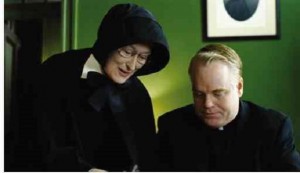
HOFFMAN said of Meryl Streep (who played his nemesis in “Doubt”): “She gave more than most. She’s incredibly alive in the moment. She has great imagination and humanity.”
When Philip dominated the awards season in 2006 for his compelling performance in the biographical “Capote,” capped by an Oscar Best Actor win, he dedicated his triumph to his mom. “She was pretty happy,” the son said but added, “She just, like, wanted something more—could you be more successful? Please. I said a lot about her when I was up there. It was a highlight for her as it was for me … and to have that moment with her.”
Philip said winning most of the Best Actor honors, beginning with a Golden Globe, was surreal. “It was a lot. I went through a lot of different feelings. I had been nominated for a lot of things but I’d never really won anything. So it was like, I got to have a year where I got to experience all of that and that was a good thing for me because I have experienced what that is.
“If I didn’t have that, I’d wonder what that feeling would be like. That’s a good thing to have experienced at the age I’m at. Hopefully, it will be a good reference for the rest of my life and how to deal with certain things and go through certain things. I’m incredibly grateful, not only for being acknowledged that way but for having the chance to actually experience that because I think those things are good to have in your cache of life experience.”
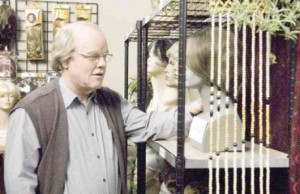
HE DESCRIBED his role as a theater director in Charlie Kaufman’s drama “Synecdoche, New York” as one of his “toughest” assignments.
Match for Meryl
As the writer Truman Capote in “Capote,” the explosive Lancaster Dodd in “The Master,” the shy Scotty J. who has a crush on Mark Wahlberg’s Dirk Diggler in “Boogie Nights,” the CIA case officer Gust Avrakotos in “Charlie Wilson’s War”—the list seems infinite for an actor who died so young— Philip gifted us with his talent to disappear into his characters.
When we interviewed Philip for “Doubt,” we just had to ask him about his scene toward the end as a priest, Father Brendan Flynn, being confronted by Meryl Streep’s Sister Aloysius Beauvier, a Catholic school principal. Philip was an equal match for the great Meryl, who played his mom in The Public Theater’s 2002 revival of Anton Chekhov’s “The Seagull.”
“We shot that scene probably for two, three days,” he recalled. “Different takes for different [camera] setups. That scene is kind of the fireworks scene but I think there are other scenes in the movie that are just, if not more, compelling. It’s what they’re not saying. That scene is about confession of whatever they’re confessing. They both kind of confess to each other and you don’t know what.”
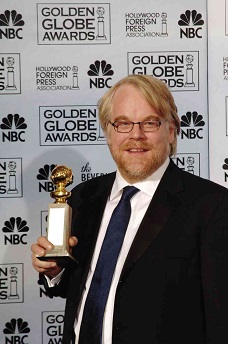
HOFFMAN won Best Actor-Drama at the Golden Globes for “Capote” in 2006. © “HFPA” and “63rd Golden Globe Awards”
Credits fellow actors
He added about that memorable scene, “What’s so fabulous is when she says that she committed a mortal sin. I’m really interested in what her mortal sin is. Aren’t you? Aren’t you like, what is that? What did she do? But that’s what she did. Do you know what I mean? It’s like what did they do and you’re not going to know. That’s the compassion thing. The scene when the three of us are there (with Amy Adams’ Sister James) in her office when she first lays it on, I just think there are so many moments like that which make it a very well-written piece.”
Philip credited fellow actors in scenes for helping him give those nuanced performances. “They give you a lot and Meryl gives you more than most. That’s not to knock everyone else but I’ve worked with her three times (including the Coen brothers’ 2005 stage production of ‘Theater of the New Ear’). She’s incredibly alive in the moment. She has a great imagination and a great humanity about her. She knows what the word play means. She knows how to play and so you get together with her and you play. You play hard and seriously and the work always has a certain spark of life to it. That’s what you’re looking for.”
Philip did not think actors try to get one up on each other. “No, actors really don’t compete,” he declared. “If you get caught up on the idea of competing, you’re going to act badly. What you really want to do is you want to show up, you want to do your part—meaning that you’re trying to do it. You can’t do it without the other person. Not every scene is about trying to beat the other person.”
Asked about his biggest doubts in his life personally and professionally, Philip answered, “You’re sure and then you are not sure about almost everything. You can be so sure about something and then you’ll have these moments, these flashy moments where you’re like, oh God, should I have done that or did I do that well or did I do that right? That question is not about specific answers. That’s just the quality of living on this planet. That’s what life is. That’s what life’s like.
“You wake up and your decisions through the day are fraught with, is that what I should do? Sometimes thinking about them, sometimes you are and sometimes you’re doing something, you’re not thinking about it. All of a sudden you think about it, you go like, maybe I shouldn’t do that anymore.
“I just think that the play (‘Doubt’) is getting at that, that those doubts become stronger—when you realize that maybe they change in order when life’s changing, without you even doing anything against. It’s going to change despite yourself or that you actually feel the need to do it. That’s because there’s a lot of doubt and question coming into it and you’re starting to have fears based on that insecurity. This film touches on all that stuff. ”
Uneasy with fame
He was never at ease with his fame and sudden loss of privacy. “It’s unnatural to be comfortable with losing your anonymity because before you lose your anonymity, you don’t think about it,” he said. “Anonymity is like having a left arm—you don’t think [about it]. It’s just there. You walk around ‘privately’ in public. When somebody that you don’t know starts to recognize you, wants to talk to you, it’s like your left arm becomes foreign to you. That’s my best way to explain it. It’s something that I don’t think you ever really become accustomed to because it’s against the nature of how your brain works.
“So I do think you battle it instinctively. It’s a survival thing and it’s hard to explain. So you always want to say, listen, it’s not you, it’s the fact that I just don’t want to take another picture because I’m going to lose it … my head’s going to blow up. Because it’s going against something … But there are a lot more positives than negatives of having success in this business. I’m very grateful for those things. I’m very accepting of whatever’s happened to me but that aspect of losing your anonymity is a weird thing. It just is.”
While he gave us masterful performances, Philip said that he was not always confident. “Being confident is about the moment,” he said. “You can be incredibly insecure one moment and confident the next and it doesn’t matter if it was 20 years ago or now. I walk in every situation with a certain level of fear or confidence based on that day. It’s not a constant. It’s something that changes.”
On how having kids (he had three—a son and two daughters with costume designer Mimi O’Donnell with whom he was in a relationship for 15 years) impacted his acting, Philip replied, “That’s a life thing. Having a child is a very intimate, personal thing. It’s something that you desperately do not want to taint. You desperately do not want to talk about it with people you don’t know. It doesn’t really affect your work in the sense that you actually try to keep it separate. It’s something that you really try to go like, this child must be brought up without the anxieties, pressures and nonsense of what I do with my life. They have to experience their own and that’s really what it is. It’s not like you go to work, I have a child and I’m different.”
He talked about his daily activities with the kids. “It depends on them—what they’re up to. Usually spending the morning with them—breakfast, we go to the park, read. We play. It’s hard because when you play with a child, that could be anything. Children want to do anything. So I’ll play with my kids in numerous different ways, depending on what all of a sudden strikes their fancy. It’s more about the time. Time spent that you’re there. That’s all that the kids want—for you to be there and for you to be there for them and for you to be focused. It’s good stuff.”
Asked about the toughest films he had done, Philip cited one, Charlie Kaufman’s drama, “Synecdoche, New York.” Philip gave one of his best performances as Caden Cotard, a theater director obsessed with making one final magnum opus. “That was a tough one. That was not only emotional; it was a lot. We shot a lot of stuff in nine weeks. It was one of the hardest films I had to do. We shot it completely out of sequence like usual but this was even more difficult than usual because there were so many scenes. Especially the aging sequences. And what the film was getting at—this rush at the end of life and all the grief and loss. It was a lot but it is a film I am very proud of.”
(Email the columnist at [email protected]. Follow him at https://twitter.com/nepalesruben.)
